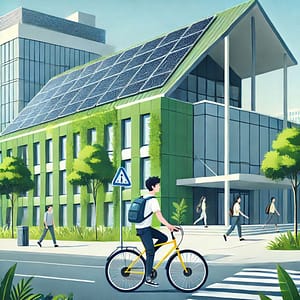Eco-Friendly Student Housing in Lancaster: Sustainable Living for Students
As the world becomes more environmentally conscious, students in Lancaster are seeking eco-friendly housing options that align with their values. This guide explores the benefits of sustainable student living, offers tips on finding the perfect eco-friendly accommodation, and highlights some of the top options available, including Bayt Student Accommodation.
The Rise of Eco-Friendly Housing
Eco-friendly housing is gaining popularity among students for its environmental and health benefits. These accommodations are designed with sustainability in mind, reducing carbon footprints and promoting a healthier lifestyle. Eco-friendly housing in Lancaster is particularly appealing due to the city’s commitment to sustainability and green initiatives.
Benefits of Eco-Friendly Student Housing

Energy Efficiency
Eco-friendly homes use energy-efficient appliances and renewable energy sources, such as solar panels and wind turbines. These features not only reduce the environmental impact but also help students save on their energy bills.
Sustainable Materials
These accommodations are constructed with sustainable materials like bamboo, reclaimed wood, and recycled metal, which significantly reduce the environmental footprint. By choosing housing made with these materials, students can contribute to a more sustainable future.
Improved Air Quality
Enhanced ventilation systems and the use of non-toxic building materials lead to improved indoor air quality. This can have a positive impact on students’ health, reducing the risk of allergies and respiratory issues.
Lower Utility Bills
Energy-efficient features such as LED lighting, low-flow water fixtures, and smart thermostats result in significant savings on utility bills. Students can benefit financially while living sustainably.
Finding Eco-Friendly Housing in Lancaster
- Research Online: Start by looking for student housing listings that emphasize sustainability. Websites like Bayt Student Accommodation often highlight their eco-friendly features.
- Visit in Person: Schedule tours to see eco-friendly features firsthand. This will give you a better understanding of the accommodation’s sustainability practices.
- Ask Questions: Inquire about the building materials, energy sources, and waste management practices. Don’t be afraid to ask detailed questions to ensure the housing meets your sustainability standards.
Student Housing Options in Lancaster
- University Housing: Many universities, including Lancaster University, offer eco-friendly dormitories equipped with sustainable features.
- Private Rentals: Look for landlords who prioritize sustainability and offer eco-friendly accommodations.
- Green Co-Living Spaces: Explore co-living options that focus on communal sustainability efforts. These spaces often include shared resources and initiatives to reduce the overall environmental impact.
- Bayt Student Accommodation: Bayt offers a range of eco-friendly student housing options in prime locations, approved by Lancaster University Homes. Their properties are designed with sustainability in mind, featuring energy-efficient appliances, sustainable building materials, and excellent waste management practices.

Tips for Living Sustainably
- Reduce Water Usage: Take shorter showers, use water-saving appliances, and fix any leaks promptly to conserve water. Install aerators on faucets to reduce water flow without compromising performance.
- Recycle and Compost: Properly sort waste and participate in composting programs available in your area. Many eco-friendly accommodations provide facilities for recycling and composting. Educate yourself on what can be recycled and composted to minimize waste effectively.
- Use Public Transport: Minimize your carbon footprint by using public transportation, biking, or walking. Lancaster offers a variety of public transport options, making it easy to get around sustainably. Consider carpooling with friends or using ride-sharing apps for a greener commute.
- Energy Conservation: Unplug electronic devices when not in use, switch to energy-efficient light bulbs, and make use of natural light during the day. Use power strips to easily switch off multiple devices at once and reduce standby power consumption.
- Sustainable Shopping: Buy products made from recycled or eco-friendly materials, and support local businesses that prioritize sustainability. Opt for second-hand items and consider renting or borrowing instead of buying new.
- Eco-Friendly Personal Care: Choose personal care products with natural ingredients and minimal packaging. Support brands that use sustainable practices and avoid single-use plastics.
FAQ’s about Eco-Friendly Student Housing
Q: What is eco-friendly student housing? A: Eco-friendly student housing refers to accommodations that are designed and built with sustainability in mind. This includes using energy-efficient appliances, sustainable materials, and incorporating features that reduce environmental impact.
Q: Why is eco-friendly housing important for students? A: Eco-friendly housing helps reduce carbon footprints, lower utility bills, and promote healthier living environments. For students, it provides an opportunity to live in alignment with their environmental values and contribute to a more sustainable future.
Q: How can I find eco-friendly student housing in Lancaster? A: Start by researching online listings that emphasize sustainability. Visit properties in person to see the eco-friendly features firsthand and ask detailed questions about the building materials, energy sources, and waste management practices.
Q: What are some examples of sustainable materials used in eco-friendly housing? A: Sustainable materials include bamboo, reclaimed wood, recycled metal, and non-toxic building materials. These materials have a lower environmental impact compared to traditional construction materials.
Q: Can eco-friendly housing save me money? A: Yes, eco-friendly housing can lead to significant savings on utility bills due to energy-efficient appliances, low-flow water fixtures, and smart thermostats. Additionally, many sustainable practices can reduce overall living costs.


